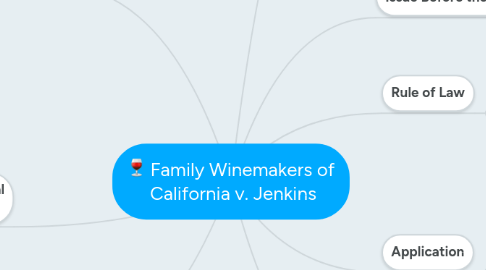
1. Impact of Decision
1.1. Anheuser-Busch, Inc. v. Schnorf, 738 F. Supp. 2d 793, 2010 U.S. Dist. LEXIS 91732 (N.D. Ill. 2010)
1.1.1. Cited in regards to law being discriminatory despite being considered neutral on its face. Relevant context from case: "A law also is considered discriminatory if it is neutral on its face (i.e., does not by its terms favor in-state interests over out-of-state interests) but discriminates in purpose or has a substantial discriminatory effect on interstate commerce." Source: LexisNexis
1.2. Coors Brewing Co. v. MÉndez-Torres, 678 F.3d 15, 2012 U.S. App. LEXIS 8634 (1st Cir. P.R. 2012)
1.2.1. Cited in regards to discrimination against interstate commerce. Relevant context from case: "("[W]hen a state statute is allegedly motivated by an intent to discriminate against interstate commerce," to determine legislative purpose, "we look to 'the statute as a whole,' including statutory text, context, and legislative history" Source: LexisNexis
2. Why should a business professional care?
2.1. A law that's not discriminatory on its face can still be considered discriminatory under the Commerce Clause.
2.1.1. States cannot regulate interstate commerce to the effect that in-state companies will be favored over out-of-state companies.
2.2. A business professional should be concerned with laws that directly impact his or her business. If a business is operating out-of-state, it is important to understand the implications of unfair regulation.
3. Current Business Practices
3.1. As outlined in Anheuser-Busch, Inc. v. Schnorf, the state of Illinois cannot prohibit out-of-state breweries from distributing directly to retailers while allowing it for in-state breweries.
3.2. According to Siesta Vill. Mkt. LLC v. Steen, 595 F.3d 249, 2010 U.S. App. LEXIS 1760 (5th Cir. Tex. 2010), the court ruled that it was not unconstitutional that only retailers with a physical presence in Texas could deliver to consumers in Texas. Substantial evidence in violation of the Commerce Clause was not presented. This directly affects out-of-state retailers attempting to deliver in Texas.
4. Facts
4.1. Parties
4.1.1. Plaintiff: Family Winemakers of California and other Massachusetts residents
4.1.2. Defendant: Eddie J. Jenkins, chair of the Massachusetts Alcoholic Beverages Control Commission
4.2. Procedural History
4.2.1. A 2005 Massachusetts law allowed in-state wineries to get licenses to combine distribution methods through wholesalers, retailers and direct shipping.
4.2.1.1. The statute was found to be invalid under the Commerce Clause.
4.3. What Happened
4.3.1. After the 2005 ruling, Massachusetts implemented a new statute in 2006 that did not explicitly differentiate between in-state and out-of-state, but defined "small" and "large" wineries by gallonage.
4.3.1.1. "Large" wineries defined by producing more than 30,000 gallons of wine
4.3.1.1.1. "Large" wineries produce 98% of the country's wine.
4.3.1.1.2. No wineries in Massachusetts were considered "large".
4.3.1.2. "Small wineries" defined by producing less than 30,000 gallons of wine
4.3.1.2.1. All Massachusetts wineries were considered "small".
4.3.2. The plaintiff claimed the 2006 statute gave an unfair advantage to in-state wineries.
4.3.2.1. The statute prohibited "large" wineries from using all available distribution methods. "Large" wineries must remain within Massachusetts' three-tier system or distribute directly to consumers.
4.3.2.1.1. The three-tier system included rigid separation among producers, wholesalers and retailers.
4.3.2.1.2. Large wineries must apply for a separate license to ship to Massachusetts customers directly.
4.3.2.2. The statute allowed "small" wineries to use all available distribution methods, including wholesaler, direct distribution to retailers and direct distribution to consumers.
4.3.2.2.1. Allowed "small" wineries to offer their full range of wines could increase overall sales.
5. Issue Before the Law
5.1. Whether the 2006 Massachusetts statute violates the Commerce Clause and is therefore unconstitutional.
6. Rule of Law
6.1. Commerce Clause
6.1.1. Plaintiff must show that the Massachusetts'statute substantially burdens interstate commerce.
6.1.2. Plaintiff must prove the statute counts as discrimination under the Commerce Clause.
6.1.2.1. Discrimination under the Commerce Clause is defined as "differential treatment of in-state and out-of-state economic interests that benefits the former and burdens the latter".
7. Application
7.1. The plaintiff argued that Massachusetts' gallonage of 30,000 to define "small" and "large" wineries was discriminatory.
7.1.1. "Large" wineries produce 98% of the nation's wine. All of these wineries are out-of-state.
7.1.1.1. Defendant failed to provide evidence that the statute was not discriminatory.
7.1.1.2. The court ruled the Massachusetts statute was discriminatory under the Commerce Clause.
7.2. The plaintiff argued "large" wineries were at an economic disadvantage.
7.2.1. "Large" wineries could not combine distribution methods to benefit from complementary markets.
7.2.1.1. The court ruled that the Massachusetts statute gave "small" wineries an unfair competitive advantage and therefore violated the Commerce Clause.
7.2.2. "Small" wineries could combine distribution methods, leading to higher overall sales.
